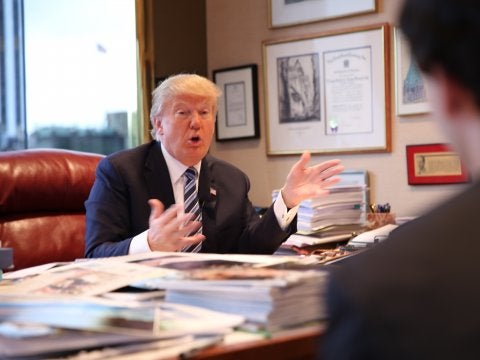In a post-truth world here’s how to spot politicians fact dodging
A current favourite is to respond to critical analyses by asserting that 'we do not recognise those statistics/that account/the document' – keep your eyes open and you’ll see the construction everywhere


It is perhaps appropriate that the first use of the term “post-truth” occurred in reference to an American presidential scandal. According to Oxford Dictionaries, which last week made “post-truth” its word of the year, the adjective’s debut appearance was in a 1992 article by Steve Tesich in the Nation magazine. His subject was the Iran-Contra scandal, which dogged Ronald Reagan’s second term in the White House.
On the face of it, the Iran-Contra affair had twin motives. The first was to secure the release of American hostages held by Hezbollah in Lebanon by selling arms to Iran – the assumption being that Iran, which was then under an arms embargo, could influence Hezbollah’s leaders into letting the Americans go free. The second motive was to raise funds which could be channelled to the Contra rebels in Nicaragua, who were then posing an armed challenge to the country’s socialist regime.
When news of the Iran weapons deal leaked out, President Reagan denied that the US was in the business of trading guns for hostages. At worst, he knew he was telling a big fat lie. At best, it was a statement that paid only a passing regard for truth. Yet ultimately, Reagan’s untruth didn’t much matter. Tesich’s point in 1992 was that the American people had consciously or subconsciously come to a decision that, when it came to Iran-Contra, truth was less important than outcome.
Of course, Reagan wasn’t the first politician be “economical with the actualité”, as Alan Clark so charmingly put it. Yet for the most part those who hold public office have perceived lying to be unpopular with electors – Iran-Contra and the odd Clark-style infidelity aside. That is why most politicians try not to tell porkies. Yet as the Reagan example shows, it isn’t lying per se which voters won’t stand for. The lies which will lead to a politician’s downfall must satisfy at least one of two criteria: they must have a deleterious impact on a very large section of the public; or they must have been made by the politician in an attempt to feather his own nest, not the nests of those he represents.
This is why Donald Trump’s lies have not proved unpopular – at least not yet. To lie about his opponents (Hillary being a “criminal”; Barack being born outside the US and so on) does not adversely affect his fans. To lie about the threat posed by dangerous immigrants directs an untruth towards people who cannot vote. Time will tell if the lies come back to haunt him now that, Producers-style, he has found himself in the midst of a triumph he did everything possible to avoid.
But how to react to all this? Mainstream politicians are in a quandary. One answer is to conclude that truth is irrelevant for everyone now and that the best way to combat one false narrative is with the creation of another. That hardly seems like a recipe for national or international harmony. The other solution is to hold the light of scrutiny over the deceits of the post-truth brigade and for its opponents to be clear and truthful in their own messaging.
Jeremy Corbyn’s attack on “the fake elitism of rich white men like Nigel Farage and Donald Trump” was an example of the latter this weekend. He has the advantage of being in opposition perhaps, but the flashes of straight-talking clarity from the Labour leader in recent weeks have served to highlight how much the British political establishment is still reliant on fudgy jargon. Most obviously, we have the Prime Minister’s favourite catchphrase: “Brexit means Brexit”, which tries to brook no argument by its utter inanity. Yet as we all know, “bollocks means bollocks” and at the same time “bollocks means testicles”. It all goes to prove that one man’s junk is another man’s treasure.
Another current favourite of Government spinners is to respond to critical analyses by asserting that “we do not recognise those statistics/that account/the document” – keep your eyes open and you’ll see the construction everywhere. This is an attempt to take on a Trumpian tactic of casting doubt on a claim without actually answering it. It is a slightly malevolent version of answering a question that hasn’t been asked.
Now is not the time for mixed messages, or for politicians, who know in their hearts the value of democratic liberal traditions, to try to mimic outsiders like Trump or le Pen by veiled attacks against “experts” or reasoned opponents. Most men and women in authority do not want or need to lie. But the desperate desire not to be proved wrong has resulted in a fear of answering almost any question without bolting on caveats or indulging in verbal gymnastics. Being honest may seem unfashionable at the moment – but in the end, truth will out.
Join our commenting forum
Join thought-provoking conversations, follow other Independent readers and see their replies
Comments
Bookmark popover
Removed from bookmarks